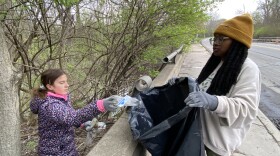
Kelly House | Bridge Michigan
Reporter, Bridge MichiganKelly House covers Michigan environmental issues for Bridge. She joined the Bridge staff in March 2020. Previously, Kelly reported for the Oregonian, where her coverage of the environment and other topics garnered national honors and sparked state efforts to better protect Oregon’s natural resources. She has a master’s degree in environmental law from Lewis & Clark Law School and a bachelor’s in journalism from Michigan State University. She is from Harrison and lives in Lansing. You can reach her at khouse@bridgemi.com or on Twitter at @Kelly_M_House.
-
An appeals court ruled the Department of Environment, Great Lakes, and Energy did not go through all the steps required by law when it made its PFAS rule.
-
Michigan communities with PFAS in their water supply could be eligible for payments from chemical manufacturer 3M, after the company reached a $10.3 billion settlement to address federal lawsuits from hundreds of water supplies across the country.
-
Michigan's less extreme weather and freshwater are assets as other regions suffer drought and seal level rise. Should the state market itself as a climate haven?
-
A Wisconsin tribe wants a judge to shut down Line 5, citing fears of a rupture in the Bad River
-
Michigan is the only U.S. state without a statewide septic code. Hundreds of thousands of leaking septic systems foul Michigan's waters.
-
Thanks to the Clean Water Act, the Rouge is no longer a dumping ground for industrial waste. But its gains are fragile and incomplete with contaminants still soiling the river bottom and the fish that returned to its waters.
-
Permitting delays have tacked on another year-and-a-half to the planned Line 5 tunnel project under the Straits of Mackinac Assuming the project gets needed permits, construction won’t begin until 2026 at earliestThe tunnel was supposed to be completed in 2024
-
Michigan Attorney General Dana Nessel gets another chance to convince a judge that her Line 5 lawsuit belongs in state court.
-
Outdated federal water laws and chemicals that were approved for industry without assessing for risk leave Ann Arbor and other communities struggling to ward off water contaminants before they foul drinking water supplies.
-
Some Michigan lawmakers want to declare water a human right. The push comes as Michigan utilities resume water shutoffs following a COVID-19 moratorium.










